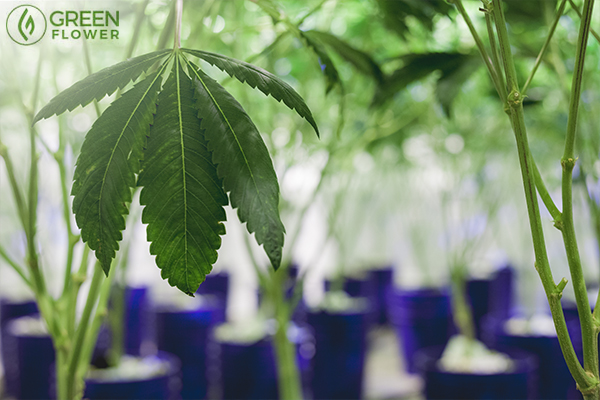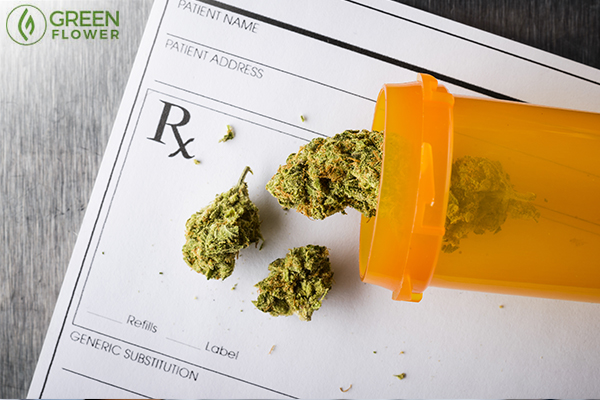
Cannabis legalization is a good thing.
Although, unfortunately, the rise of legalization has resulted in medical cannabis programs being rolled back. That has certainly been the case in Washington and Oregon, and is likely to happen in other states that voted to legalize.
The reasoning that some elected officials have offered up is that if cannabis is legal for all adults, why is medical cannabis still needed?
I often get asked if it’s even worth still being a patient in a legal state. I live in Oregon, and despite cannabis being legal here, I am still a registered medical cannabis patient.
I know from first-hand experience that medical programs are still needed, and the Green Flower team feels the same. Below are some reasons why we feel the way we do.
#1) Adult-use laws do not provide safe access for patients under 21

In every state (and Washington D.C.) where cannabis is legal for adult use, the legal age is 21. For patients over 21, legalization may be a great thing for safe access. However, for patients under 21, legalization does not increase safe access.
To be fair, legalization helps patients who suffer from a condition that is not covered by a state’s medical cannabis program because it creates an avenue for them to legally access medicine, provided that they are over 21 years old.
Many patients across the U.S. under the age of 21 still need medical cannabis programs in their home state so that they can continue to treat their condition with cannabis.
#2) Medical cannabis provides for increased cultivation limits

A very big reason why I became a medical cannabis patient in post-legalization Oregon was so I could cultivate more cannabis plants in my personal garden.
In Oregon, the cultivation of 4 plants is legal for adult-use purposes per household, but having a medical card provides for an additional 6 flowering plants. It also provides for the cultivation of an unlimited amount of non-flowering plants.
Not every state has as high of plant limits as Oregon, but it’s still a big benefit to having a medical cannabis program in a legal state. Every state should have similar provisions as Oregon does that allow for additional plant limits.
In Washington State, being a medical cannabis grower is the only way that a person can cultivate at home due to the provisions of the cannabis legalization initiative that passed there in 2012.
#3) Medical cannabis allows patients to possess more medicine

Just as a patient can cultivate more cannabis, they also can possess additional cannabis.
A person who consumes cannabis for adult use can easily get by just possessing an ounce of cannabis flower or some edibles.
Most patients don’t have that luxury, especially if they are using cannabis to make infused edibles. It takes quite a bit of cannabis to make strong edibles that patients need, with most recipes for strong butter or oils taking more than an ounce of cannabis.
In Oregon, I am allowed to possess 24 ounces at my home, in addition to the 8 ounces that the adult-use law affords. As one patient, that is plenty of room to work with as long as I’m mindful of my harvesting schedule.
#4) Medical cannabis patients are entitled to tax-free purchases

In Oregon and Washington, adult-use cannabis sales are taxed, but medical cannabis sales are not. That was very important for patients who should not be taxed for purchasing their medicine. Taxing adult-use consumers is one thing, but taxing suffering patients is a completely different matter and should be avoided at all costs.
Initial rule-making discussions in California have that same concept being pushed, which is good news for patients.
It is no secret that the cost of medicine in America is expensive, and increasing every year. The industry has a real chance right now to create one of the most stably priced medicines in the country, with the tax-exempt status being a big part of that.
A clear public policy distinction needs to always be made between adult use and medical use if for this very reason alone. Otherwise, patients will get lumped in with adult-use users and many will be priced out to the point that they won’t be able to afford their medicine any longer.
#5) Medical cannabis patients require guidance
The tax breaks and growing allowances, etc are all great. However one of the biggest issues with rolling back medical cannabis programs after adult-use legalization is patient care and guidance.
Doing away with medical cannabis sends the wrong message to patients and healthcare facilities alike, and it leaves them without a framework for guidance and getting the most benefits from cannabis.
– This article was originally posted at Green Flower
About CBDWire
CBDWire (CBDW) is an information service that provides (1) access to our news aggregation and syndication servers, (2) CBDNewsBreaks that summarize corporate news and information, (3) enhanced press release services, (4) social media distribution and optimization services, and (5) a full array of corporate communication solutions. As a multifaceted financial news and content distribution company with an extensive team of contributing journalists and writers, CBDW is uniquely positioned to best serve private and public companies that desire to reach a wide audience of investors, consumers, journalists and the general public. CBDW has an ever-growing distribution network of more than 5,000 key syndication outlets across the country. By cutting through the overload of information in today’s market, CBDW brings its clients unparalleled visibility, recognition and brand awareness. CBDW is where news, content and information converge.
To receive instant SMS alerts, text CBDWire to 21000 (U.S. Mobile Phones Only)
For more information please visit https://www.cbdwire.com
Please see full terms of use and disclaimers on the CBDWire website applicable to all content provided by CBDW, wherever published or re-published: https://CBDWire.com/Disclaimer
Do you have a questions or are you interested in working with CBDW? Ask our Editor
CBDWire (CBDW)
Denver, Colorado
cbdwire.com
303.498.7722 Office
[email protected]
This article contains Third-Party Content submitted by third parties, including articles submitted through the CBDW Premium Partnership Program. All opinions, statements and representations expressed by such third parties are theirs alone and do not express or represent the views and opinions of CBDW or its affiliates and owners. Content created by third parties is the sole responsibility of such third parties, and CBDW does not endorse, guarantee or make representations concerning the accuracy and completeness of all third-party content. You acknowledge that by CBDW providing you with this internet portal that makes accessible to you the ability to view third-party content through the CBDW site, CBDW does not undertake any obligation to you as a reader of such content or assume any liability relating to such third-party content. CBDW expressly disclaims liability relating to such third-party content. CBDW and its members, affiliates, successors, assigns, officers, directors, and partners assume no responsibility or liability that may arise from the third-party content, including, but not limited to, responsibility or liability for claims for defamation, libel, slander, infringement, invasion of privacy and publicity rights, fraud, or misrepresentation, or an private right of action under the federal securities laws of the United States or common law. Notwithstanding the foregoing, CBDW reserves the right to remove third-party content at any time in its sole discretion.







